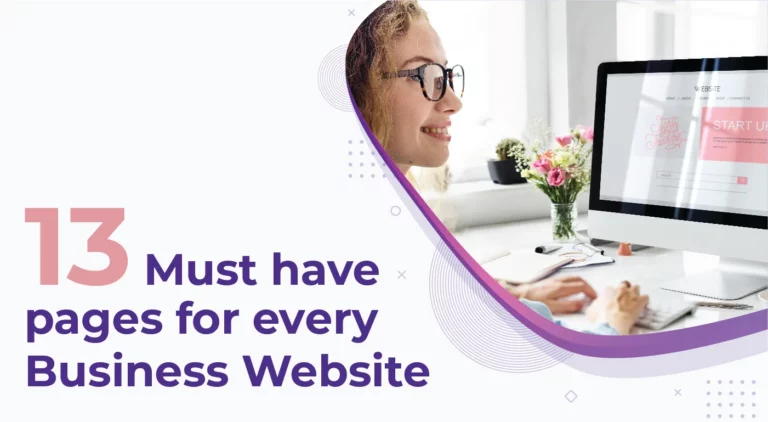29 Apr, 2022 | Web Design Services
13 Must have pages for every business website

-
Home page:
Home page is the primary landing page of any site. The design layout of the web page must be simple, sober, yet classy. Since it’s impossible to talk about all of your offerings in detail, you need to be short, specific, and precise here.
-
About Us:
Like yours, there are so many businesses out there. When dealing online, there is a huge risk of confrontation with fraudsters, and this makes it critical for people to trust businesses online.
-
Services:
You can have a distinct service page, or it can be linked to the briefs you have mentioned on the home page. From the perspective of SEO, it is advisable to create distinct service pages for each of your offerings.
-
Product/shop page:
This page is mandatory only for ecommerce and product-based businesses. The shop page for ecommerce websites will have a lot of things to care about; we will talk about it in another separate blog. Talking specifically about product-based businesses only, you have to create short descriptions and briefs of features.
-
FAQ page:
To answer frequent queries from the clients, FAQ page can be helpful. FAQs bring assurance to your website visitors that you care about their concerns. By adding these questions, you will reduce the fraction and save more of your time of answering common concerns individually. This gives more clarity to your customers.
-
Testimonials/Reviews:
People don’t believe what they read, but they believe in what they see. Testimonials are the voice of your clients, and they are replaced with term ‘reviews’ for the products.
-
Contact page:
On your contact page, you can add a contact form as well as share your business details like name, the physical address (if any), email address and contact number.
-
Blog:
The service business doesn’t have new things coming up every now and then. With the help of your blog page, you can keep your visitors engaged with some form of informational as well as marketable content. Here, you can talk about your offerings and how different products are beneficial for your customers. Your entries like the ones in journals will be displayed in the chronological order. - Your blog page can be a great source of lead generation as marketers are leveraging the power of quality content to entice more customers to engage. And, you need not be technical all the time. Just be relevant to your field and talk about your opinion regarding updates and innovations coming by. You can keep your content interactive to let people connect more.
-
Press and media page:
You may be launching your new product or attended some meet-up recently. In this section, you can add all such information and add another option to trust your business. You can also share the employee recognition and some inter-company events that you have conducted or participated in. -
Privacy policy:
Every business online is known to collect the cookies of the visitors and use them to improve customer experience. If you are asking the customer for their personal information like name, email address, contact number, you have to clarify its usage in the privacy policy of your site. This is solely to maintain the transparency of your policies that you are adapting, and this keeps you safe against any trust breach issue if any customer puts any allegation on your business. -
Terms & Conditions:
You may call it T&C, Terms of Service or by any other name. To market your services or products online smoothly without any confusions, it is better to make your customers agree upon the terms you are putting for the usage of your offerings.
-
Sitemap:
The sitemap is nothing but the index of your website. It is set to be mandatory page to help search engine bots crawl through your site and improve your ranking in the SERPs. HTML versions that are added to your site as a web page are to help your visitors with easy navigation. XML versions are known to be helpful for search bots.
-
404 error page:
404 error page or page-not-found page is also to be created. Yes, you read it right. You need to create the page that’s already not found. Well, that’s to show to your customers that what they are looking for is not available on your site.
Frequently Asked Questions
For a business website in the United Kingdom, essential pages include: 1. Home page - where visitors land first, with an overview of the business and what it offers 2. About us page - providing background information about the company and its team 3. Services/products page - showcasing what the business offers and what sets it apart from competitors 4. Contact page - with all relevant contact information and a contact form for inquiries 5. Testimonials/reviews page - featuring positive feedback from happy customers 6. Blog/news page - providing relevant industry news and company updates 7. Privacy policy page - outlining how the business handles personal data of its customers and website visitors, in compliance with GDPR regulations. Additional pages could include an FAQ section, careers page if hiring, and a gallery or portfolio of the business's past work.
In the United Kingdom, testimonials or reviews from satisfied customers are some of the most effective ways to increase credibility on a business website. It's best to use authentic customer reviews that share specific details about how the product or service has helped them or solved a problem they faced. Reviews that include photos or videos of the product or service being used can also be powerful, as can reviews from well-known or respected individuals in the industry or community. Additionally, using testimonials that have been verified by a third-party service can also increase credibility.
some essential pages that should be included on UK business websites are the company's mission statement, About Us page, contact information, testimonials/reviews from satisfied customers, frequently asked questions (FAQs), and a privacy policy outlining how personal data is collected, stored and used. In addition, an "Events" page highlighting any upcoming conferences, trade shows or exhibitions the business will be attending can also be beneficial for networking and reaching new clients.
Yes, every UK-based business should have a page dedicated to their terms and conditions, as well as their privacy policy in compliance with GDPR. Additionally, showcasing any industry awards, accreditations, or certifications you have received can help build trust with potential customers. Including customer reviews and testimonials can also be beneficial, as well as a clear and concise "About Us" page to give visitors a sense of who you are and what your business stands for in the UK market. Lastly, having a page dedicated to your contact information, including a physical address, phone number, and email, can help customers easily reach out and connect with your business.
A "Contact Us" page can offer a seamless and personalized experience for visitors by including a clear and concise form for visitors to fill out with their inquiry or request. The form should ask for relevant information such as name, email address, and the reason for contacting. Other ways to offer a more personalized experience include including contact phone numbers or physical addresses, as well as offering a live chat feature where visitors can speak with a representative in real-time. It's also important to ensure a timely response to inquiries by setting up email notifications and having a dedicated team to respond to requests promptly. Additionally, adding a FAQ section to the page can also be helpful in addressing common concerns and providing answers to frequently asked questions.

